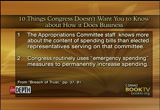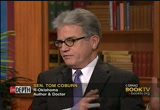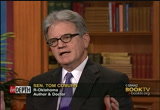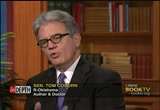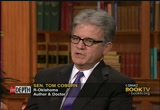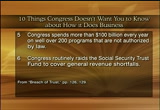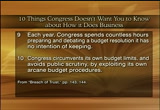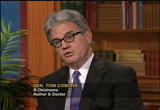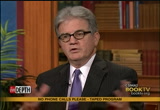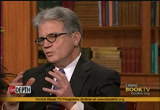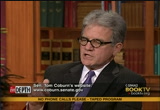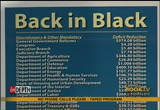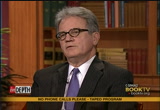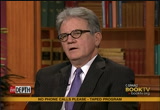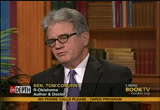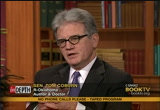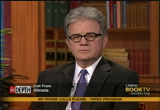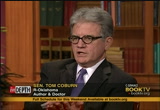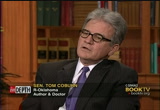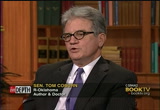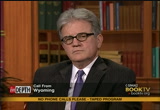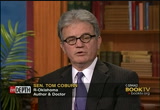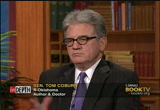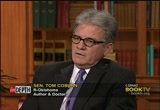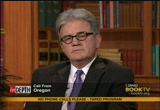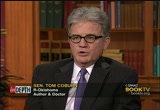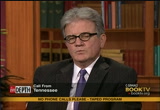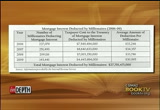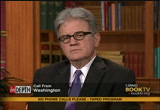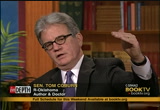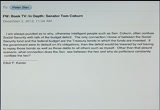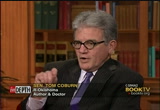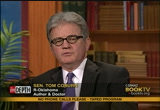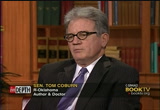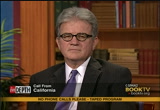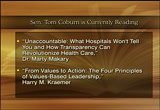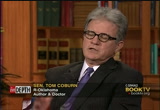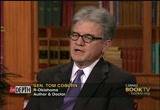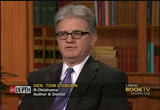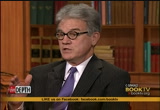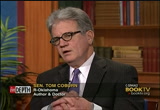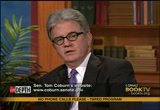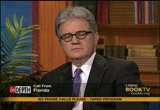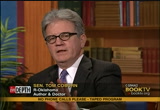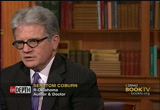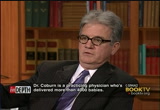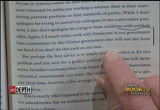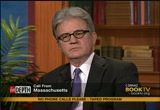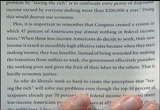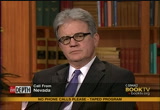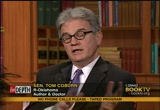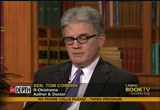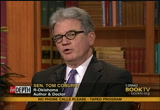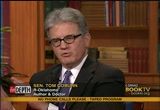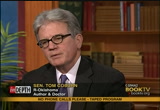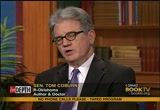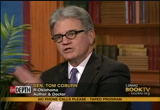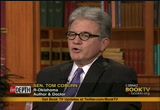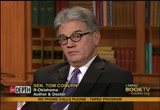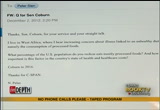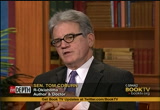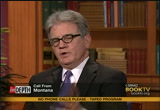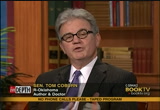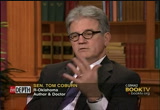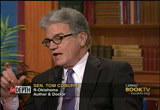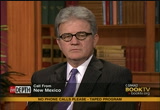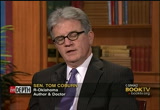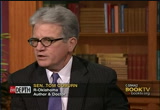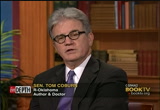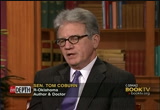tv Book TV In Depth CSPAN January 21, 2013 3:30pm-6:30pm EST
3:30 pm
>> up next author, dr., u.s. senator tom coburn. the acclaimed author of breach of trust talks about long-term deficit reduction, health care, the future of the republican party in more. the second term senator from oklahoma is latest book is the debt bomb. a bold plan to stop washington from bankrupting america. >> senator tom coburn, who is ross "kelberg? >> i'm trying to recall. >> the case in the 1940's. >> short. a chicken farmer. also a wheat farmer. and roscoe sued the federal government when they told him that he could not raise the adequate amount of we that he
3:31 pm
wanted to because the government had decided there were going to control replanting. what he said was a okay, but i can raise we for my chickens. he took it all the way to the supreme court and lost that battle. >> what you recount the story? >> because it is a great example on the enumerated powers and what -- what we find ourselves in the place we are in now? how do we get here? what do we do about it? what other ramifications. the greatest way for the government to make something expensive is whether government to make it affordable. and all you have to do is look at the programs. the average of a shared cost of health care before we created medicare and medicaid? iran the same as every other aspect of our inflation. in other words, there was no
3:32 pm
differential between health care costs. now that we have a government program what has happened is health care costs are too, sometimes three times the rate of the average inflation in the economy. so what you did is, number one, you had a supreme court ruling that it was in the best interest of the country to take away the liberty of individuals. the congress had actually gone outside of the enumerated powers which list very specifically what the congress can do and yet the supreme court held out the abandoned enumerated powers. also, the trumping of the tenth amendment. wind -- >> net comes to the commerce clause, you use that with the supreme court justice and a testimony. you reprint that testimony. your back and forth. what was the question you asked
3:33 pm
her about fruits and vegetables? >> well, could the government tell you, mandy to you how many fruits and vegetables you eat it a. it really arises. where is the role with the government in terms of our lives? can come in fact, the commerce clause be viewed so widely as what was done in full burn versus the united states? can it be interpreted so widely that we could eventually get to the point where we can mandate will we are doing? we're doing right now. the new rules from the united states department of agriculture to the schools on terms of what they will feed in the school lunch program, we are having an uprising across the country because of their rejection of what the government is saying. here is what you have to eat. here is what is available. the point is, our founders knew
3:34 pm
that for true liberty and freedom to be their there had to be personal responsibility. and when the government goes beyond the level of which a prudent exercise of government. i'm not against government, but i recognize there is limitations in terms of what the government can do. the limitation is based on what we can do well. as you look at what we're doing and the oversight that we have over last year's shows where we are not doing well. so the idea was, to raise that question and the consciousness of the readers of the book, what did our founders say about the commerce and general welfare clause? they describe it, if you read the federalist papers, a very, very limited commerce clause involvement of the federal government. a very, very limited expos say
3:35 pm
of what the general welfare clause would be. we have taken those terms -- pardon me -- and markedly expanded beyond what our founders intended. the result of that will beat a demi nation of our liberties and freedoms. if you go to the school and you are buying lunch at the school and the usda out of washington is telling you what you can eat them what you can eat a lot with what your parents and local school board, i would say a considerable amount of freedom of the parents and also the children and the school's administrators has been taken away. >> what about the common good? good to have less obesity? >> sure. everyone is for less obesity. do you think we can mandate less obesity by government regulation ? what that does is ignore the idea that there is personal responsibility and personal accountability.
3:36 pm
you know, we are going to talk about the tragedy of american compassion later on in this segment written by. [indiscernible] the whole assumption is, can you have freedom and grow their freedom and liberty without personal responsibility, personal accountability? and so there is a balance there. in my opinion having lived, 65 years and seen what my freedom and my responsibility was when i was a young man forces will we have transferred to the federal government, i think it is very, very dangerous for the altar of freedom of our country in history would put that forward. if you look back on the history of republics the same things happened to every other republic. as the government has grown, the freedom has become diminished. >> senator, you write in the debt bomb, our government today is so massive that it is impossible for any one member of congress to know everything.
3:37 pm
as a result, members to become highly dependent on staff, lobbyists, and interests who are all too eager to label their obedience and ignorance as purity for whatever cause the interest groups could. >> our motivations are too often, as members of congress, how do we please those people who will enable us to stay here? looking at the next election to a greater and stronger. then looking at your up of office and have you do what is best for the country in the long term regardless of how affects your political career. >> is that in your view a form of corruption? >> no, i don't think it is corruption. i think it is natural human nature.
3:38 pm
the people of congress are great people by and far. well-intentioned. they love our country. they want what is best for the country, provided they can still have a say in it. and so you get the natural tension of doing what is best for the country, even though it hurts my political career. and that's a pretty tough decision. only very courageous people will do that routinely. you know, when your desire is for position and power and the original desire was well intentioned and well-meaning and you confuse or rationalize that position against standing
3:39 pm
outside of that and looking, if i was not partisan, if i was not in a political position, will be the best position to the country those to be conflicted because of our desire for position and power or political career. i am not critical. a thing public-service a wonderful thing. we have transitioned in our country too often, especially in the senate, to people who are very limited and exposure to the real world outside of the political arm. that is very different than what we had the first hundred years and our country's history. most of the people had broad ranges of experience in the private sector. in other areas of life and brought that information, experience, wisdom, gray hair to
3:40 pm
solve the problems of the country. that is more limited now. i hardly will ever vote for somebody that is a career politician. you know, as a physician i no human nature. i see it. i see both the positives and negatives of it, but i also have done to see as a senator. i saw some as a member of congress because i wrote on this in breach of trust how that fits intersected and undermined and ultimately not in the best interest of the country. >> you wrote breach of trust about your time in the house elected in 1994. the so-called gingrich revolution. going into congress in 1994, what was your enthusiasm level and the process?
3:41 pm
>> i thought we are going to fix and address the promise of our country. i was awakened to the fact that this and as we begin a majority staying in power was more important will we promised. consequently and you saw from after 96, party pretty well abandoned spending restraints or after 97 essentially. >> tel long before you were disillusioned? >> in the house? >> yes. >> the customer probably two
3:42 pm
years. >> two years. >> i saw some hints of it. the rudder starting to shift. how do we stay here. how'd we enhance our majority. my thought is it's wonderfully okay to lose an election. if you do it based on principle and sticking to the core values that you promise to voters that you would do. >> in breach of trust and i'll washington turned outsiders and insiders you right, ten things congress does not want you to know about how it does business. number one, the appropriations committee staff knows more about the content of spending bills then elected representatives serving on that committee. number two, congress routinely uses emergency spending measures to permanently increase spending .
3:43 pm
number three, members are routinely bribed for votes by being given total control over millions of dollars to be used for their pet projects. you want to address any of those first three? >> well, let's address the third one first. how if you have a transportation bill they want your vote on the transportation bill, but will call you up and see where you want to spend this for your 60 or $80 million. here you as a member of congress can go and politically benefit either you're weak areas by saying look at this rhoda bill for your town or look at this project with over the water. i tape recorded and put it out. >> the phone call from the transportation committee.
3:44 pm
>> yes. i put it out because there is no way i know where the next stop light ought to be in oklahoma. there is no way i know what the number one priority is. and so when the same thing happened in the senate not long after i came to the senate i directed all the money that was transferred to me, i think it was 80 million, to go to the state department recitation director who is from oklahoma who has the responsibility of making the priorities and working with oklahoma legislators. but it is interesting other than the interstate system in the areas where we truly have commerce, local roads in oklahoma, local bridges in oklahoma, how did we ever get it to where the federal government was deciding what our priorities are going to be in those areas? ami, that is a great example of how we have transferred power
3:45 pm
from citizens to washington, and we consume a portion of it. come back. tell you where you spend the money rather than the citizens of the state of oklahoma deciding where their tax money will spend -- be spent. so, again, and i will tell you, transportation costs all lot more to build a highway today because we have tried to make it available and it has become expensive because we have added all these rules and regulations, all these requirements. a large portion, about 18 percent of of federal highway budget does not go to build the first, bridge, highly tomorrow. goes for enhancements. it's not something that people in oklahoma necessarily what. remanded the percentage that you have to spend on something other than that from a gas tax from putting gas in your tax. to me that is ludicrous. those are nice things.
3:46 pm
why it's getting ready to happen. what the possible solutions to get out of. here is a great example of how we got in trouble in the first place. what our founders believed was that we would have a very limited central government. i absolutely believe that we should have a limited central government, but it should be authoritative in terms of the areas that we give a responsibility. beyond that what you do is he totally diminish hall of these laboratories of experimentation, all these regional differences when you take it and pull that power away and said it in washington. what you're doing is markedly diminished liberty and freedoms of people outside of washington. >> is attempting? >> not for me. when i ran for the senate one of my campaign themes is, not bring
3:47 pm
anything of the oklahoma. the reason is, there is no money here. anything we send you home we are stealing from your children today. i mean, remember, out of the. half trillion dollars last year that was banned, over 1 trillion we borrow from our children. we did not borrowed from the chinese. we borrowed it from the people who were ultimately point to pay back. so is attempting to spend money and enhance yourself? shore, it is. but the point is, to meet it is a moral wrong to steal it from the next generation because what you're really doing is stealing their opportunity to be free. and if you look in the context of history, every other republic died. we are doing the same thing that every other republican experienced before they collapsed. and the whole reason for the debt bomb, the reason i read it,
3:48 pm
if people can understand where we are and how we got there and what the solutions to our, we go through the back in black. we list 9 trillion. we get the gao to allied thrust -- or duplication of federal government has gone through two-thirds of that now. the last report will come in april of this year. they have already identified 200 areas where we have multiple programs doing exactly the same thing. with no oversight by congress, no metrics to see if it's working. and that comes close to $200 billion a year in wasted money, wasted money that is not enhancing what it was intended to do or not facilitating what it was intended to do. >> in the debt bomb you have duplication and federal programs. science, technology, engineering, mathematics education programs.
3:49 pm
209 of those. surface transportation, 100 plus. picture quality, 82 programs. economic development 88. transportation assistance, 80 financial literacy among 56 different programs, job training forty-seven different job training programs. homelessness and the prevention, assistance, plenty programs. food for the hundred and 18. disaster response prepared this cannot be met, 17 different programs. >> well, it is not just a land is that we have that many programs. what is also outlandish as we don't know if they're working because when they are passed there is nothing that says you have to have a metric to see if it is accomplishing the goal. in the base defect of the congress since i have been here has been the total lack of oversight of most of the programs. >> you recount in the book a story about taking an amendment
3:50 pm
to the senate floor to get rid of some of these duplication programs, duplicative programs. what happened? why did it pass? >> we had one for $2 million pass but all the rest of failed. >> why? >> because all of these programs have constituencies. by the way, we found another 52 programs for job training for the disabled. so we actually have 106 job-training programs are 109 that we spend $24 billion a year on. we pretty well demonstrated in a, we study them all in oklahoma. at my field reps go out and say hire these people in oklahoma. we pretty well have figured out the federal programs don't work. the ones that are outside the federal government, the states run themselves to work. you know, the question is, if their is a role for the federal government in job training,
3:51 pm
shouldn't it be efficient, effective, congress be looking to see how works? should we have metrics on the? should we have 57 different -- 47 different programs that cost $19 billion per year. should we know if we are getting value for our money? and so what happens is congress, if you question that the first thing people will do, you don't want people to get job training. in other words, you get demonized. i pretty cut -- pretty well get used to being demonized. there is not a subject of won't take on if i think it is appropriate for us to look at it but most people won't do that because they don't want to get labeled as saying i don't want to help people with job training i don't want to be accused of not solving the problem. therefore, cover my eyes to my ears, mouth and and let it continue. as yourself this. thomas jefferson said there is
3:52 pm
no rule for the federal government in education if we want one we need to pass an amendment to the constitution to do it. he was for changing the constitution to get a role for education. but he said, how is it that we have all these training programs run by the federal government dusting a billion dollars a year run out of washington to train teachers who are actually a local and community and state responsibility? how do we get there? and, oh, by the way, does anybody know if they are actually improving teacher training? actually improving the skills of our teachers. so it's really two questions. the constitutional role of the federal government and if their is a legitimate role or if there is in, you're spending the money. shouldn't you know? should we, when we pass this, say you're the metrics which will use to measure whether or
3:53 pm
not a teacher is effective? of whether the teacher training programs are effective? >> this month on our book tv in debt program senator tom coburn who is also a medical doctor and an author. wrote the debt bomb this past year. breach of trust and not in 2003. also the author of several different reports, including this one which came out in july of 2011. he will be our guest for the next two and a half hours. we will put the numbers up on the screen if you would like to dial in and join our conversation. of course you can reach us via e-mail, twitter, and facebook. you can make comments on our social media platforms. book tv at c-span.org is our e-mail address.
3:54 pm
or to handle is @booktv. and facebook.com/booktv. you will see it posted right there on our home page. you can add a comment, and we will get to as many of those as possible. back to a breach of trust, senator. a couple more of the ten things. >> congress, by the way, coming out in paperback this january. >> just in time for christmas or the new year. back to ten things congress does not want you to know about how it does business. number four. powerful members of congress and say it's not competitive seats often hold fund-raisers outside their districts to increase their leverage over other members. number five, congress spends more than 100 billion every year on well over 200 programs that are not authorized by law. number six, congress routinely raise the social security trust fund to cover general revenue
3:55 pm
shortfalls. >> if you look at the appropriation bills which have not been done in the last two years because of the political dynamic that is going on and you go in and say, we are pretty x amount of money and then you look at how many programs it's actually up to over $350 billion now of programs that are funded that are not authorized by the congress, which tells you that there is an imbalance in congress. how do we appropriate funds for a program that we have not said we should be spending money on. and it tells you the power of the appropriation committees and the power of pork or benefit going back to the states of what is most important. is it most important to actually look good in oklahoma by the amount of money that i can direct there? is it more important to think in the long term the health of our country in the long run and how we make those tough decisions.
3:56 pm
and politically it puts you on losing side of every argument based on the force appeared. but you have to work hard to explain yourself and your state. >> number seven, members of congress frequently do not have the opportunity to read the bills they're voting on. number eight, one of the more secret and anti-democratic ways in which congress spends is directing money in report language that only members of the committee can vote on or amend. each year congress spends countless hours preparing in debating a budget resolution it has no intention of keeping. finally, number ten, congress circumvents its own budget limits and avoids public scrutiny by exploiting its own budget procedures. >> the budget resolution we are about to begin in february, is
3:57 pm
it a waste of time? >> no. right now we have a three and half trillion dollars spending. the big criticism of the last two years is congress's gridlock to. oh, really? how did we authorize spending? will we are gridlocked and is spending money that we don't have, the things that are not absolutely necessary. that is what we're gridlock over. we are gridlock over that so that we can make ourselves look good to our constituents. there is no gridlock when it comes to spending your kid's future in washington. we would not have spent that if we had a budget last year. but we did a continuing resolution that passed which means it is bipartisan, passed the republican house and democratic senate. the president signed it, yet we
3:58 pm
borrowed over 1 trillion that we did not have of which i would contend 600 billion was wasted, literally did no benefit directly for the citizens of this country other than those that took the money to administer or developer or give out the program. so you could look and to say, every program, stand-up what is actually effective and efficient what you see is minimal. the reason that is so is members of congress have an oversight, they have not done their job. the turn a blind eye and say it's hard to oversight. besides the money going to get criticism when i do. so therefore. it goes back. now we are -- now in that cr last year $350 billion for the programs.
3:59 pm
appropriated money. have either never been authorized by congress or the authorization had lapsed. that means the authorizing committees in congress are working because of were going to appropriate money whether it's of verizon not, why not just have an authorizing and appropriating committees and put them all in one. we totally ignore our own rules. >> how much fear is there among members of congress? constituents, criticism of not being reelected? >> i think it runs the gamut. but i think you need to look at me be a larger perspective. you know, i was a businessman long before i was a physician. built the business. i became a physician as an older individual. i was known as groupon and my medical school class and practice for 25 years.
4:00 pm
my goal was to be a physician. i was not at the risk of my populous other than my reputation with my physicians. my patients. so if you put it in context, it depends on what the goal of the house member of the house of representatives or senator is. the goal is to fix the problems in the country, to create at least as good a future for the next generation to follow us as we have had, and if that goal is above your personal will of getting an office that has notoriety, power, and position, you're going to do fine. ..
4:01 pm
4:02 pm
of the country is in trouble we are bankrupt. there's a great article if you take a generally accepted accounting principles the same thing c-span has to operate under, the same thing every business has to operate under. we right now have $88 trillion of things we have to pay for but we have no idea where we are going to get the money over the next 75 years. 88 trillion botts 1.05 trillion more over the next 75 years if we didn't grow the government or the economy at all what if we put ourselves in the possession. the federal reserve has increased its balance sheet and created $2 trillion worth of
4:03 pm
money they printed $2 trillion worth of money and ultimately the pain of that is going to fall on the middle class and the very poor in this country and it's going to defeat what both parties say they want, yet we don't have the courage today to make the tough choices even if it means we lose our seat to secure the future for this country. we put ourselves first instead of the country first. it isn't hard if any american can go to the website and read it there's a lot of common sense ways to save money. just this last week the air force announced in the federal government we agreed to spend $64 million on i.t. projects, that's 64 billion. the gao says at least half of
4:04 pm
that will be wasted. it will never be completed and will never do what it's supposed to do. in black and a black with a program that said you ought to cancel this. we said this two years ago you ought to cancel this because it is never going to work. here is how inefficient government is. this week the air force canceled it. another $100 million on the political cancel. they paid a settlement fee to cancel it of $8 million. but two things didn't happen. the person that was responsible for that contract didn't get fired and wasn't held accountable, and the company that didn't provide the service didn't get our money back the taxpayers of this country. nobody runs their household that way. most governments don't operate that way. but we are totally incompetent when it comes to spending
4:05 pm
america's tax payer money so why do we continue to waste $32 billion a year on it programs that don't work for the federal government? that 60% of what they want to take additional the of the pentagon and that is government-wide. so why would we do that? where is the leadership in the congress that we are going to get this stopped? we have a special subcommittee to look at this, oversight, look at the bad actors, look at the bad actors in government coming and we are going to demand the people that make those decisions get fired and the countries that are not performing get paid back. none of that happens. so you can and defraud the federal government coming you can outperform on a contract and you can do it with impunity and that's because members of congress are basically not willing or are inexperienced to not know that you ought to be able to hold people accountable for what they say they are going to do. whether it is a federal employee, a procurement
4:06 pm
employees or the company that's providing it and that is flexible that happened this week my father started a business for the products and i started a plastic lens and interocular lenses division of that and i did that actually in southern virginia. i lived up here for ten years from the summer of '69 to the summer of 2008. >> does the company still exist? >> parts of it had been sold so portions stila exist. >> host: how old were you when you went to medical school? >> guest: 32. >> host: what occurred to you to go to medical school at 32? >> guest: i had fun on the business side and had a battle when i was working for other people and i was used to making
4:07 pm
decisions that built a pretty good-sized business and very profitable and i saw that business torn apart by people that didn't have an interest in the business but wanted to profit on the product and the price in the service. >> host: eight years in medical school? >> guest: seven. >> host: practiced for 25 years? >> guest: this is the first year i've not practiced. >> host: how are you retired officially were you chosen not to practice? >> guest: i couldn't afford to pay the malpractice insurance and i can't offset the cost. so it was money straight out of my pocket after-tax money. so it was very difficult. >> you were not allowed to earn an income as a doctor? >> guest: no. after you leave the senate do you plan on going back to medical? >> guest: it depends how far back. i continue to do medical education depending on what my skills are.
4:08 pm
i wouldn't want me taking care of me i wouldn't go back. >> host: senator coburn where did you grow up? >> guest: casper wired homing in a town called muskogee to rehearse the what did your mother do? >> guest: my mother raised four kids. >> host: are you married? >> guest: i have a lovely wife and high schools we'd -- sweethearts. >> host: does your wife lived back in muskogee? >> guest: she comes back a couple times a year. i commute the one thing i said i would do. this is an exceptional weekend that i stayed here for the show but i commute every weekend. and i need that both emotionally and mentally to get back in the perspective of what people think. to me i think there is a dearth
4:09 pm
of common sense, in muskogee oklahoma and i will get all sorts of good advice from people looking in the overhauls and with a varied as i can learn a lot by being home. >> host: in breach of trust you write whatever member of congress go it seems everyone is reminding us that we are at the center of the universe. the typical meeting with constituents or business groups begin with them showering praise at the defeat of their representatives. >> host: if you want something what is the best way to do it, sugar or sour? i guess i would say it's important in life where you get
4:10 pm
your strokes, and if you get your strokes from your job or from other people, you are going to have a tough time in life because you are going to make some critical mistakes. i get my strokes from my face and my family. and i feed my face especially allows me to stand stronger when i'm attacked because i think about and pray about and try to think long term. i'm not running again ever for a political office. when i ran for the senate it was a tough decision to try to do this the second six years. the question ought to be asked why can't use the plane if you're meeting with others.
4:11 pm
what is the character that i think is lacking not just with the elected leaders across a great portion of the country in terms of this character traits that will better solve and secure the future. >> host: you talk about your faith. are you christian? >> guest: i am. >> host: when it comes to constituency and being a member of congress, have you ever had elapsed where you've gone in for that? >> guest: sure. it's easy to fall prey. that is the struggle of all of our lives isn't it that we put ourselves first or somebody else first. it's when you do for other people, not for yourself. he would be measured on how you would help other people game. so it's easy to fall into that
4:12 pm
trap of putting you first and what i found in life is my most content moments is when i'm getting my life away to someone else rather than of my own life. the idea that people work continually to try to achieve a level of being in the center in the know. so what do you do to get their. it's like c. s. lewis, like peeling an onion. first you to cover off the onion and peel every lawyer and when you have the last leader what do
4:13 pm
you have? there is nothing left. so it is a false pursuit probably the paradox is if you don't pursue the entering and you pursue getting your life to other people that you are going to be in the entering. >> host: senator tom coburn as our guest on book tv on c-span2. tallman downers grove ilana you are the first call. >> caller: hello, how are you doing. i am a -- i work and social security as a claims representative and i think that there is so much we can do we can't support these people. we can't support people having four wives, people are 65 having
4:14 pm
kids from 66 growing to the widows to the retirements. don't raise the rate. go back to 1935. if you raise their age you will have construction workers, people who do manual labor when they apply for disability as 62 and raise the rates to the >> host: i apologize. i thought we finish with you. do you believe the social security age should be raised? >> guest: i think it should be raised that very slowly. but i think you can do what he is worried about, the guy is that to the forced heavy manual labor.
4:15 pm
you can create a category that qualifies them not for disability, the phrase is great question. if you go back to the qualifications on social security that are set in 1935, remember retirement was at 65. average life expectancy was 64. this is a great example. it's a little bit critical, but it shows you the politics have done. it adds benefits to social security without adding a tax stream to pay for it and i will give you a couple examples. today the people on social security -- i not talking social security, i'm talking social security will collect $21 million in real dollars that
4:16 pm
they put in. they will get paid $21 trillion more than they put in and it's going to grow, not just social security. one and 17 people when this country today are collecting social security disability. there's not many people in oklahoma that i asked who actually believe one out of every 17 people in this country are disabled. so what happened? how did we get it to where we have one in 17 people in this country on disability? s. con. res.'s problem of the field oversight said the last four years we've added more people to social security disability than in terms of new jobs. most people don't realize that and it is my belief that some
4:17 pm
30% of those are not truly disabled according to them all. so we have all these problems and i think that your call's suggestion to go back and look at what our commitment was in 1935 and try to compare to what our commitments for today and how we do that the people that were cut social security are great people. the problem is the judge is hardly ever listened to them. somebody going to disability has always been denied by professionals at the social security administration. what we have is judges who actually end probably one-third of the time don't do the correct work and follow the guidelines are set out for them. i'm talking administratively all judges and so we have seen this ballooning disability payment, which by the way medicare disability trust fund will be out of money in two years.
4:18 pm
at the end 2013, the end of 2014 we will be totally out of money which means everybody that is truly disabled will be getting a reduction in the amount of their payments every month. the social security taxes on your salary over the next 18 years are scheduled we will probably eventually go higher than that those paying the higher amounts are getting paid more so we have to figure out a way to go back to the point in the preaching of trust. we get excess money until 2010 and social security. the government wrote an audio you and then we turned around and rather than stating that
4:19 pm
money we turned around and spent eight because johnson created the unified budget so we no longer have that fire will. and so all of a sudden now the 02.6 trillion to social security that we are going to have to borrow as social security on linus which is about 2030, the regular social security problem. >> host: matthew posts senator coburn, three questions. one, the social security and other social entrance programs like medicare and medicaid infringe on personal responsibility? number two, cbo reports federal health spending will dominate mandatory spending by the mid 20s 30's. >> host: there's been a lot of psychological and social research on this. if you think somebody else will take care of you, and it's your
4:20 pm
government saying you will, then you are less likely to plan or prepare for that. and cbo is right my generation will hit 65 in march and there's 3.5 million of us this next year that become eligible for medicare and the next year 3.5 million become eligible for social security. because that was in the tip o'neill and ronald reagan six. that's why the demographics are so important when you have health care costs rising. so it is a hard question. what the government has done is undermined personal responsibility because if i can pay a flat fee at the beginning of the year monthly to where i have no other payment on my health care and i don't have to
4:21 pm
worry about it, most of the time i'm going to do that, but what does that do to the consumption toward overconsumption of health care and your listeners will be offended at this but when we study of we know it's true and have the same disease set as one that does. what does that tell us? what that tells us is that if we know -- if we know we are not paying any more for something, then we will tend to over consume. we will be less frugal if you're telling me i can go to the mall this afternoon when we finish and buy christmas presents on your credit card will ids frugal with your credit card as i would with mine?
4:22 pm
the answer is human nature. the studies show no, you're not. what we have to do -- there is a second thing that i think is important. when we undermine personal responsibility of individuals, we actually oftentimes don't help them, we hurt them. because what we do is put a glass ceiling on the ability to read i have this young constituent in tulsa oklahoma who's a young african-american male whose mother's boyfriend hit him when he was a teenager and broke his neck. he became a quadriplegic and she's worked very hard the rest of his life. but he was caught in this trap. he worked for one of the oil companies in tulsa. if he got a raise because he's a quadriplegic and he's single, he
4:23 pm
had to have help. if he got a raise, he would lose medicaid for his health care to and i'm talking if you're a quadriplegic you do need somebody to help you at night, in the morning, etc.. what's our program? our program is if you get to the next point, you lose it all. rather than have a program that tapers off your benefits as you rise in your income so we don't have that anywhere in the country where we can meaningfully encourage people to grow and achieve high, and what they can yet we have these flat takeoffs, the scene on disability. if you burn a certain amount, you lose your disability. and maybe you could lose a portion and continue to expand your horizons and capabilities and accomplishments before you eventually could get off of it. we have all these things and we have a young guy in oklahoma by the name of jason price who
4:24 pm
works with our disabled and over the last several years has had 4,000 people, he's put to work that were truly disabled and about 1800 of them were totally off of disability. what he is doing is allowing them to accomplish things rather than put a ceiling you can't do this. but his estate program he has nothing in the federal government, so you know, the tragedy that's why i'm interested in talking about the tragedy of the american compassion, the tragedy is that people don't achieve what they possibly could because we put a limit on what they can do because they participated in something rather than be a helping hand, we have become the supplier and said once you do x we are no longer your supplier. >> host: next call comes from chaka and caspar wyoming. >> guest: >> caller: i don't have to tell you this by coming from your birth city.
4:25 pm
senator coburn is a true legislature you use your position so effectively and that is why i would like to get your opinion of the future of the republican party and the conservative movement kid and i'm very interested in the idea of returning to what is the 1970's and deacons was called safe conservatism and the idea that the rebellion, this idea that conservatism should be anti-democratic, pro-life and about articulating federalism in a way that people will still be -- will stop being so focused on the federal government solving so many problems and focus on solving those problems willfully like you're talking earlier about the issue is being decided out of washington. and that makes conservatism populace in a different kind of wait and the word stickney used to meet its populace because the government will flanagan be out for people because people would realize that the government trusts them to solve their own problems. and i just was wondering how you
4:26 pm
define the conservatism and what the republican party is doing now that prevented from fully being a stage conservative party and the other question i have is you mentioned in a press conference in the deficit-reduction plan a ton of times that this budget is there a way that you could also write a proposed budget that could be published in the format? thank you. >> guest: let me answer the question on the budget first. they've taken it is in the back and. senator paul has done essentially the same thing. line at the trend to the $10 trillion serious it can be done. since i'm not on the budget committee have chosen not to do that you can implement what is in and negotiate off that and you can actually going long way towards solving the problems. by the we come back and black as a trillion dollars of revenue increases. we've had that out there for a year-and-a-half almost two years
4:27 pm
where we think it's appropriate that we see revenue across-the-board the way that it should be rather than the hills getting a leg up on the others on the system. >> i'm not a big party guy. i am a big freedom and liberty person. i've made my share of mistakes as a center in terms of some of my votes. but i think the founding principles ought to be what we ought to be increasing. history tells us that republics don't survive when you no longer have the character traits and personal responsibility for that. so, you could have a conservative populist movement but it have to be embraced across the country that says that we would like to have some of our freedom and with that we would take on more responsibility. but i am not sure -- i went to
4:28 pm
bed after this next election thinking that we were a more divided country than the center-right country that we may be passed the point where all the republics die where they can vote on things from the treasury. in the fiscal calamity happens and ultimately the republic crashes. i'm not saying that's when to happen but it's certainly a threat and if you look at the budget deficits and you look at the risk for the debt that we have that's why i wrote this. all of the support programs that we have for the very word or would be lessened as a consequence within the means.
4:29 pm
>> host: jesse tweets and how can they learn to effectively message the contract of america? >> guest: one of my comments after the election is people don't care what you think until they know that you care. i don't think that republicans articulated what they were for and what was important and what was at stake. actually my belief is we are going to have to suffer some of the consequences of our board governing over the republican and democratic administrations and the consequences start happening there have been the last ten years and they are to be much worse in the next two that people will either awakened or give up.
4:30 pm
things change in this country in terms of unwinding the civil discourse. i think we've run the risk of that and we are not out there communicating what is at the basics of us living together, working together and how we do that and when we demonize each side to undermine what we know isn't the intent but when we do it in such a way, what you do is create new extremes on either side but i think are dangerous for the country. we are polarized on issues, but we need real compromises and real leaders in washington today to solve that rather than to fan at. >> host: you put down some criteria from the tragedy of american compassion give relief only under personal investigation of each case get
4:31 pm
on the immediate necessary articles. give of what is least susceptible to abuse, give only in small quantities under proportion to immediate need and less than might be prepared except in cases of sickness. give it the right moment and not be on time that it's needed. require of each beneficiary abstinence from intoxicating liquor. this who manifest purpose to depend on assistance. then you go on and right of the american people practice these principles and their own families, communities and neighborhoods and require the government to do the same, we would solve our debt crisis. >> it's important that when we go to help somebody we don't
4:32 pm
just held their immediate need to be that we give them the courage, the confidence and the support to help themselves. my contention is that too often in our parts of compassion, our well-meaning mess that we have lost a lot of the ability to allow people to help themselves because senator jeff sessions just put out a think in october the senate budget committee looked at all the programs and what the average family beneficiary was on all of the social welfare programs is $150,000 a year per family to get think about that. that's without taxes that's greater than the average family income in the united states. so, we have now moved those and
4:33 pm
this isn't to deny anybody that needs our help. but what we have now done we have a safety net that is equal to the average per capita income in this country. so what that does is it takes away any incentive to better yourself because you are equal with everybody else in terms of the benefits. that is significant. very significant in terms of motivations and people bettering themselves and people reaching higher that is a worrisome statistic. >> portland oregon, good afternoon. this is booktv on c-span2. >> mr. colburn, well, thanks. i would start off by saying that you are a great man of integrity and it is a pleasure to talk to you. >> thank you. >> caller: ibm and fdr democrat and we've crossed this bridge before although obviously
4:34 pm
it wasn't quite as great a situation when it comes to the debt when you're talking about $88 trillion we know that money can't be paid back. we are trying to purchase our way all of it. so, what is wrong with going back to what fdr did and doing more infrastructure projects to put people back to work on the real living wage so we can start to pay down the debt? >> guest: there's nothing along with that we don't have the money to do both what you have to do is scale back what we are doing to be able to do that. remember what of what we did under fdr was have a much larger component of labor than what we do today. if you think about building roads or dams or bridges all i would embrace that if we did that on balance to where we
4:35 pm
could do it but also could be administered better if you did it on a per state basis rather than the federal government and the printer fees' or set by the states rather than the government what was important for them and let them manage it but there's a big difference in the cost of living in this country so what you would do the and we never take that into consideration except in the medicare payment fees' we don't take that into consideration in terms of the other projects we do so why would not reject that out of hand at all. >> host: abraham manchester tennessee please go ahead with your question or comment for senator coburn. >> caller: thank you for taking my call. i heard a quote from you that began a fan of the jack welch principal in reverse for congress 90% of members every election only keep the 10%. my question to you, senator do
4:36 pm
you consider yourself 10% as productive in congress and can you elaborate on what specifically you done to help reduce our government deficit? >> guest: sure. i would be happy to. >> host: that quote is directly from the debt bomb. >> guest: it is. all you have to do is look at what my host has out in front of me. nobody in the senate or congress has done more oversight than i have of my staff. we have looked at more a areas of government. when i was a majority member and committee chair, we did more oversight in those two years in 2005 and 2006 than the rest of the entire senate in terms of looking at where the problems are. my contention is if the american people knew what i knew, you would fire 90% of us. you may even fired 100% of us but the fact is large amounts of your future and you're children's future is being wasted every day because we
4:37 pm
won't do the hard work of one identifying the waist and the number two, changing the programs and putting them metrics on so that they don't waste money and they actually accomplish something. i've said this, tomorrow i could create $600 billion worth of cuts that nobody in america would feel except for the people that are directly getting the money that we are spending on administering the programs. i would invite you to go to my website and look at all the oversight that we have done. we've offered more amendments on the senate than anybody else to eliminate waste, duplication and fraud, look at those and ask yourself why the other 90 senators, doesn't matter what party they are in haven't done the same thing because if they were doing the same thing what i think you'd see is a totally different congress and the problem is i can have the debate on the floor and there may be two or three senators there the rest of the senators don't know and their staff will look at it because they're too busy trying to figure out how to please
4:38 pm
their state rather than to govern the country. >> host: here is some of center colburn's report subsidies of the rich and famous. money for nothing what was the 600 page report. do you think about publishing that in book form? >> guest: not really because i've done that with federal money and that would spend a ton of federal money to do it and people can get it on the website. you can go through that and it is not searchable and it's easy to look but there's $9 trillion, 1 trillion in the savings of interest that there is a trillion dollars worth of tax cuts, tax increases and revenue enhancements and $7 trillion worth of spending reductions which would put us in ten years the balance of the budget and after that ten years paying off our debt.
4:39 pm
when you talk about tax increases and revenue enhancements, would you be in support of? >> guest: if you look at what we put out in subsidies for the rich and famous, what a lot of people don't realize is a well-connected and healton washington create benefits in the tax code that benefit themselves, doesn't benefit the average business, benefits the average person and so we outlined in that subsidy of the rich and famous i think about 29 billion per year. if you go through everything at the very wealthy and get back from the federal government some of that is medicare and social security. i readily admit that but the rest of it is not. so, for example, let's take a mortgage home deduction. if you look at the bye $200,000 of income per year, it looks like those under 200,000 majority of it when you look at the average household income in
4:40 pm
this country is around $51,000 right now it's gone down $4,000 in the last five years if you were to look at that as the average american, everybody above that takes about 85 percent of it. so that is in for the average american. that's for the more well-to-do american. >> who is going to support that? we can't have home building without a mortgage deduction. most people don't realize in canada you get no mortgage interest deduction. there's not. they have a high your home ownership rate than we do before the downturn and they do now after the downturn. so, was the mortgage interest deduction for the benefit of homeowners or was it for the benefit of the home builders or was it for the benefit of the very wealthiest we ought to ask those critical questions and know what you're talking about before we just routinely say we have to have a mortgage interest deduction and we ought to ask
4:41 pm
who does this affect. so if you just kind of the what the income scale what you see is a vast majority of people making 1.5 or two times the average family in this country makes. and according to this report by senator coburn a mortgage interest deduction by millionaires, 2006 to 2009. in 2007 taxpayer costs to the treasury of mortgage interest deducted by millionaires from $8.6 billion in 2009 it drops because of this fiscal crisis. $4.4 billion was the cost to the treasury. 143,000, 41 millionaires that year took mortgage interest deductions, and by the way some of those were second homes, floating homes. as we ought to ask the real question is do we really want a fair tax code and should we treat everybody the scene and
4:42 pm
proportionally the same i would tell you on the mortgage deduction, we don't. gambling losses conducted by millionaires, $4.1 billion in average amount of gambling losses deducted per millionaire, $504,000, 783. so why should we allow the deduction for losing on a game of chance? if you can buy a lottery you can't deduct that. the cost of a lottery ticket. so here is where you get 10 billion, $15 billion a year. we start them on a stand transparent with what we are doing with the tax code. i don't think we ought to raise rates. i think we ought to do a significant adjustment to what we do with the tax code because it isn't fair to the and we have legislated to the benefit.
4:43 pm
i recently was attacked because i went after the ethanol, the hard right that at me, the foreign states attacked me, but the fact is we were paying large oil companies 40 some cents a gallon to blend ethanol into the gasoline that they had to do by law anyhow. yet so we saved $6 billion a year and 36 of my republican colleagues agreed with me that we shouldn't pay $6 billion to have something that has to be done and how that is mandated by law. there's no incentive. we have to do it. so that's $6 billion we didn't spend last year that we would have if we had gone after that and by the way, under of the date in washington, that a violates the grover norquist american tax reform pledge because you took away the tax break without giving an additional tax break somewhere else. what we ought to do is give a break to our kids.
4:44 pm
>> host: next call for senator coburn. you've been very patient. go ahead. >> caller: yes, it's an honor to talk with you mr. colburn. a pleasure to listen to you putative to comment. one of social security and another brother that is in his 60's and has two children under the age of the team and he received all hundred dollars a month for social security to get i about dropped when i heard that because him and his wife do not need that money. >> guest: how will this? >> caller: 67 now. i never even knew that older americans who had children were allowed to get social security for those children. i was floored if i'm interpreting this right to get and then the other comment was you are so right of the consumer had some money in the game as far as health care i remember when the co-payment was $15. i think i over reduced my medical insurance and as soon as
4:45 pm
it went to $25 i woke up and went i don't want to pay this much for just to go in for a cold or something. i will set out and deal with that. and it is amazing how human nature works that >> guest: we are all that way. you make it easy for me to not be responsible most of the time going to choose the path to not be responsible. but, you know, there is a legitimate position that we as americans ought to say. we ought to say if you're sick and you are in trouble, there shouldn't be a way that you lose your home and lose your life savings because of an illness. so what we ought to have is if we are going to have a true government involvement in health care, we ought to have an indemnification so nobody loses their home and loses their life
4:46 pm
economics because of the health issue to use what we ought to do is ensure at a maximum amount that you refer to pay per year than the minimum amount you are going to pay and we see the interchange. >> host: from eliot kantor, this e-mail in always puzzled as to why a otherwise intelligent people such as senator coburn often confuse social security with the talk of the budget deficit. the only connection i know what between the social security fund and the federal budget are the treasury bonds in which the funds are invested. if the government were to default on its obligations, then the deficit would be lowered by not having to repay those bonds as well as the debts to all others such as myself. other than that of the service scenario, what connection does the senator received in the to come and why do politicians constantly consulate the two? >> guest: i think that is a good criticism, but here's why colin quote because if you look
4:47 pm
at washington in the early 80's, a fixed social security, right? the fixed it. suppose to be fixed. well, guess what. in less than 20 years benefits for social security based on the demographics and the taxes and everything else are going to decline. so if you are 45 now, you probably would welcome us, put a fix and that so that your benefit doesn't go down between now and then. the second reason is we conflict that is because this government, our country is borrowing $100 billion a month or printing $100 million depending on what the bond sales and the only way we are going to honor that bond, the only way we are going to honor them is to get a budget in control because not only in
4:48 pm
20,031st of all we are never going to make it. that's another point i would like to make. we are never going to get they're the way that we are going in terms of it's never going to happen but we have to pay back that 2.6 trillion. where do we get the money to do that if we are not solving these other problems over here on them on the social security budget? remember that is just a piece of paper so let's say that redefault on 2.6 trillion? last year we had to put and i think about $170 billion of borrowed money back into social security. we've reduced the bond payment. the bond in the government to social security. we had to print it with paper but either we ultimately the cost the same amount and the others were through inflation but we have to eventually pay that money back.
4:49 pm
so i would go back to what i said earlier. he's white except the politicians have continued to improve the benefits without increasing payments so will you have to do is look at the trustees' report. pete $21 trillion in dollars but in inflation-adjusted dollars more than the people paid that are collecting that social security. so, they are both tied together because ultimately the government is responsible for that because it will never happen. the politicians are never going to let you take a cut in your social security payment because too many people in the country have relied upon and plan for x amount of dollars that may not be their sole retirement but they are fine. they will never say you just can't have it but what will happen and this is the danger of where we are and that's why i want to go to the other point.
4:50 pm
the worst cut in the world is inflation. it's the hidden tax that will kill the middle-income and lower-income in this country at the very poor. because what is happening now, we create money or print money alta merkley that is going to create inflation. what that says is if you own a home today, the purchasing power of that ultimately will be less. the purchasing power of your 401k or savings account or government will be less because the dollars will be brought less. so what happens is that is a stealth tax increase on everybody in america. its system of tax increase on the very wealthy. but they are the ones that it's not going to market the change the standard of living. everybody else is going to market the change. so we shouldn't be -- we shouldn't be confused.
4:51 pm
we are in deep trouble right now, and if we don't put a plan in the next 18 months out that eliminates four to $6 trillion, you are going to see another debt downgrade within a year and other debt downgrade even if we get an agreement because the dynamics of both inflation that's coming and demographics that we can't change if we want to get this read the social security trustees. the money isn't going to be there. >> caller: hello, senator. i don't think most americans care of you are a german center you would be dual headed with lieutenant governor and as in
4:52 pm
u.s. senator to have a very different approach to the federal government than we do. in my book gridlock i argue that maybe it's time to consider repealing the 17th amendment and restoring election of senators to state legislatures and i was curious about your reaction. >> guest: its self published and electric's like senator sanders people were trying to do the best but the system has gotten out of whack, and we kind of thing the constitution 4.0 to reset things. >> host: thank you for calling in. >> guest: the one problem i would have with that is that most of the legislature's, state legislatures around the country have become as partisan in terms of their positions as the
4:53 pm
federal government has. the other thing is in oklahoma for example we have term limits, so we don't have any long serving members. we have 12 members that you can serve a total in the state government. i am agnostic as to whether we should do that or not. i think the number one key to having a senator ought to be that you have about 30 years of experience in something other than government rather than 30 years of experience in the government to read >> host: mix tweets, senator, what is you have you been most demonized for? when have your hands been tied to do the right thing? >> guest: i think when i wanted account devotee of the funds coming out of new york or the funds katrina, the fund for
4:54 pm
solving the unsolved civil rights crimes or worked with a guy that was actually trying to do that and i blocked it until i could make it effective was demonized, but those words hurt, but they are not true. so if you feel good about yourself, you know, try to do the right thing even though it means you're going to take all sorts of hits. the crime, all of the big fox network people came after me because i held that up until we had a clearer oversight and we could see what we were doing. i have several areas like that. but i'm kind of used to doing it. i'm pretty careful. i think every penny that we spend ought to be spent right. i don't think we ought to waste a penny so i don't mind seeking
4:55 pm
heat asking questions and taking the time to try to figure out where we are going to spend the money and whether or not it is to be spent effectively and whether or not we will have the transparency to see whether it is spent effectively. >> host: tom coburn as in his second term as a senator to read this is your final term. why is this up? >> guest: 16. >> host: and no way you are going to run again? timoney terms did user of? >> guest: three. >> host: how many in between? >> guest: for years. >> host: manhattan beach california. >> caller: it is a privilege to talk with you, senator coburn. you are one of my very few heroes in congress or washington and i wish to heck that he would run for president. i know perhaps you would need a face john so you would look pretty like these other characters -- >> guest: i love that backhanded compliment. >> caller: but i am serious you are one of the few that really run the place crackly and
4:56 pm
actually there should be extracts from this in depth interview and you should settle the other senators and congressmen down and make them watch this because it's really terrific stuff. having said that, i have two things. you're latest book the debt bomb you talk about the career in congress and people who understand already what's going on and say he said it but the people that do not understand what's going on do not get it and what you are infering is that people take campaign contributions for changing the tax code, which they do and it's the only reason for having a corporate tax or any business tax because the customer pays it anyhow. but when you got to what your proposal was coming u.s. abandoned what you articulately champion on c-span and will solve so many of these problems. why did you give up on the fair
4:57 pm
tax and the book please? >> guest: maybe i didn't give a fair shot in the book to be an original cosponsor and i still believe it is the ultimate answer to the taxing and equality in the taxing growing our economy. it also saves 100,000 on the irs employees and will market the expand our exports because we are non-competitive when it comes to the ocean's edge because we in corporate taxes into the product every the deals we are competing with in the work doesn't. probably great criticism of the book. from our facebook page, chris makes this comment. this fiscal clef media coverage is absurd. you people are grown adults. get something done. if i couldn't get something done in my job i would probably be terminated by now. enough already. do something for all americans,
4:58 pm
not just your party or the other party. >> host: >> guest: the only criticism i would have is we are not the ones in the negotiating room, there is a limited number of people in there. i believe if you put me in the room i could get a deal done that i wouldn't do it the way to do it. all of the republicans lined up i would say what is it that we believe in? we are willing to give $800 billion in terms of income. here's what we bought for that and here's where we are going to stand. we have to reform medicare to some because the real spending is a demographic shift in growth in medicare entitlement. here's what we have to have. most people don't realize the size of the federal government is twice the size as it was 11 years ago. how many people realize that that in 11 years the federal government in terms of dollars and people most people don't realize that. so here's the things we have to have and i would say mr. president here we are putting it on the table.
4:59 pm
we don't care if we lose the election we want to save the country here's what we believe in. here is what we are willing to do, take it. >> host: you are part of the gang of six. the deficit solving the committee's to read our committees like that effective? simpson-bowles. >> guest: the greatest mistake the president made is not embracing taylor branch tiemann it cannot today. we wouldn't be here today have you taken the simpson-bowles framework although there was a lot that i didn't like i voted to move it so that we would have the debate two years ago, two plus years ago had we had the debate and actually put something on the floor we would have seen something passed. we would have allowed the legislative process we are not allowing the legislative process to work. there's 25 bills that have come out of the house that won't see the light of day and a set for political reasons, not because
5:00 pm
5:02 pm
5:03 pm
the hospital. you indicate you're currently reading that book. >> guest: i actually read it before it was published. it's a phenomenal book to uncover and expose the lack of transparent in madison. not all the problems are easily solved, but being transparent about them and the points he makes in the book about accountability and transparency in outcomes are critical to solving not only some of our health care problems, but health care quality problems. >> host: if someone had asked you, how much is it going to cost to deliver this baby, could you give her a price? >> guest: in toto? everything? >> host: what would you say? >> guest: depends what it was. i deliver times of amish and they went to the hospital, cut a deal, paid in advance and said
5:04 pm
he was a total package. health care is really interesting because if we kind of cleared everything and went back to it, we don't have real insurance. insurance means you spread your risk among hundreds of other people, hoping not risk, what you pay is enough to cover everyone. if you look at return for insurance companies, and building homes, et cetera and health insurance, what we've done is created tons of makework that doesn't benefit anybody, but not truly indemnified risk. as soon as you have a claim, what happens if interest rates go up. you didn't spread that risk.
5:05 pm
that risk is all yours or you have a small business. 25 employees and one of them gets really sick. they are spreading it all in your business. if we have real insurance, that means you have to really spread the risk. the swiss have figured out to do that. we have to take what we can learn from none in terms of spreading indemnification roundup health insurance. >> host: a little bit firm "the debt bomb" about two of your friends in the news right now. on saturday, july 30, 2011, 2 days before the debt limit deadline, i had dinner with sean boehner and saxby chambliss, who'd been close friends and serving together in the house. i share concerns with the speaker and he asked how i get to a better outcome. i couldn't give him a good answer. i had argued to my republicans the week before any default triggered by refusing to lift the debt ceiling really would be the best outcome if we could
5:06 pm
stick together in weather the storm. i was convinced her deficits had become so severe that are national credit rating would be downgraded anyway and economy to to flounder. the shock therapy of the fall could be a thing that we can congress. unless we stick together, it made little sense for me are new members to mount it, cause he mission to delay the vote and force you to follow. >> guest: first of all, ask yourself the question, when was the last time the debt limit was not increased? so do we have a tip in made in country? the answer to that is the reason were in trouble because we essentially dull. every time i pass that lets you basic, they get a raise. we've never acted responsibly to trim the waste in government.
5:07 pm
but here's the other point i made. we are going to. and here's the debt unaware going to run into in a sweat "the debt bomb" is all about. there will come a time in the near future where people won't loan us money because their expectation of our ability to pay it back will be such that we will see interest rates. that's not all that far away. you cannot ben bernanke tell you there's no inflation. most americans know that isn't true. you can have a central banker telling you there's no inflation. you can have a central bank that increases its balance sheet by to try and dollars and printing money and everybody holding the rest when he sprinting bonds and buying mortgages that that money can buy some in time for confidence is going to come --
5:08 pm
the last of confidence will calm where they're going to cash in. the chinese dropped their ownership 10% last year. why do you think the chinese government dropped $150 billion of her death last year? because they don't have any confidence in what were doing and neither do i. i want the american people to see what's going happen to a senate debt bomb explodes in everything you count time now, you're not going to be able to count on. and the very consequences of not acting responsibly now, to cut the size of government, trim it and come and meet what we can do and afford will calm at the diminution of everybody else in this country and their kids. and the debt bomb is coming. the way we behave in washington just this week, we were still
5:09 pm
playing games over the fiscal class, we shouldn't do it for trillion dollars deal. we should or $19 k-kilo and create the confidence in the world that we're going to manage our problems and downsize our government so we have a future. because the opposite of not downsizing our government, not making hard choices, i don't care for putting aside from congress. the opposite of that is a failure in the future and the loss of three-time, the loss of independence. the morning shows today talked about our lack of power and effect in the middle east. why do you think the last effect in power in middle east? because we foster economic might and reducing the effect of our military might. we won't have the money to continue to be a force for good in the world because we will not
5:10 pm
live within our means. so the debt bomb is coming. the question is how do we defuse it, and maintain the people who need help in this country, but it together and work and solve the problem rather than play the political game. we just finished. it is absolutely nauseating what is going on in washington today for both the president and republicans and democrats. everybody's ignoring the real problem. everybody's playing chicken -- the fiscal cliff is nothing compared to what's going to happen if we don't defuse the debt bomb. >> host: you write in "the debt bomb," our entire government and system dependent people buying our debt. but not stops, the party is over. what would you like to see down
5:11 pm
at the so-called fiscal cliff? should we let it occur? let sequestration happen in your view? >> guest: no. look, sequestration is the career politicians answer to not being responsible about what happened. he put everything across-the-board snatcher fought the good program to cut it and it's matcher fought the bad program archive. what it means its washington runs around all the time trying to figure out how not to make a decision so that one effect her political career. it is crazy to cut good programs the famous by programs. one of the guys at my stats that it's like your wife told you to go out and beat the flower garden and you take a lawn mower and cut everything down. that's what it is. but it tells you is how incompetent congresses today. why would we continue to have programs running that aren't
5:12 pm
effective? and yet we do to the tune of $600 billion. why would we have $200 billion worth of programs? that we have $100 billion a year defrauded out of medicare? bazaar by numbers. that's independently published eddies. $100 billion stolen from that occur every year and were worried that we have an incompetent bureaucracy in terms of addressing? why we continue to do that? we don't have a debt ceiling is my contention because every time we run against it, we increase it. so what we have to do is take time out. this government is twice the size it was 11 years ago. there's a lot of great things the government does. a lot of great things the government does not within the enumerated powers, but the first thing before we touch either of those two things, let's get rid of this stuff that doesn't work. and say to the american people,
5:13 pm
we flipped the last 30 years in this country off of the next 30. all of us are going to have to participate in paying to get out of this hole if in fact you care about your children. i had this experience in oklahoma city town hall meeting. try care for retired military was put in 1995. everybody before that, when they recruit in the military was told you cannot health care when you retire the space available basis at a military hospital. i've not heard that from hardly anybody that is written to me that retired before 1995. they promised me health care for the rest of my life. pedestal as promised. since 1995, only have we started fairly good premium for that health care increase. for a family of four, you get your whole health care for the
5:14 pm
year with no deductibles and no co-pay for $565 a year. that hasn't been increased since 1995. the cost of health care has doubled since then, maybe more than that. so i had a retired captain from the air force challenge me we would need to increase the co-pay appeared you spent 20 years in the air force. you've got another job now. you're or collect them in their first retirement annually pay $575. don't you think you have to participate? he said you detained. you're getting a benefit never guarantee to you and you don't want it increase. but cellular countries over. if none of us have to give, everybody's going to have to give over to out of this and says that plane. we have took the leadership says we've made mistakes, republicans and democrats.
5:15 pm
the bill is now due. no credit card we can now go get to pay for the interest on the other six credit cards we have. it is now time to make the hard choices. i'm going to leave to make those hard choices. i want you to follow us because here's what's going to happen if you don't. today were at historically low interest rates on federal government debt. we have 16.4 trillion. were paid less than 2% for that, less than $325 billion a year. our historical averages just shy of 6%. if you took us out to just the historical average, you're talking an additional $640 billion a year in interest costs. that's just a good average. if we get another downgrade, were not just going to go to average. we have to pay a premium as to what we paid in the past.
5:16 pm
if in fact we got 12% -- let's say 12% on $16 trillion. that's two trying dollars a year or is that going to come from? so it's over. the default is coming. either -- do we default or do we keep our obligations and make our choices? and what the federal reserve has set up is to inflate our way out of this with growing our way out of it and taxing our way out of it rather than trimming the size of our government. >> host: to go back to "the debt bomb" where you had dinner with speaker boehner and senator chambliss. senator chambliss said he could see tax increases. speaker boehner has spoken about a grand plan. how are those two guys doing? have you talked to them about those two things?
5:17 pm
just go there flabbergasted right now with the offer from the administration. when you get beat in an election coming you say he was $800. and then you have it thrown politically. it may work politically. it's past time for politics in our country. we're really in trouble. do we have problems they can solve? is every problem in front of a solvable? it's not solvable if our whole goal is to play politics rather than solve problems. so when you have the speaker put out a kind of sick leave and say here's 800 billion. that figure the rest of his death. fumigate $24 trillion? then play hardball we've seen i don't think it's great for our country. they were politically in hard drive a little more, but real leadership is pulling people
5:18 pm
together, not dropping him apart. i think we are seeing way too much training people apart. >> host: senator tom coburn will be with us for another hour and 10 minutes on our booktv "in depth" program. "the debt bomb" cannot this year. preacher tress came out in 2004. available at his senate website. (202)585-3880 or this in the eastern and central time zone would like to participate. (202)585-3881, not meant pacific time zone. a reminder you can contact us electronically as well. booktv@c-span.org. twitter is@booktv and you can make a comment on our pace the page as well. they spoke.com/booktv. clark in ohio, good afternoon.
5:19 pm
>> caller: hi, can you here me? i've seen a few things to your staff. maybe he didn't see it. i want to talk about good science, bacteriophages. as you study those in college? there in our body now. otherwise who would swell up and die because bacteria double in size every time minutes. good faces combat phases. we can reduce the cost of hospital acquired infections by $30 billion to $40 billion a year. that's called race, would you call it? by using bacteriophages. santa fe and affirmation to sadr barrasso a medical doctor. at that defense and some information about reducing the cbo cost curve for medicare, medicaid by 2%.
5:20 pm
just 2% adoption will face this will reduce the cost curve. over north carolina as we speak, lawsuits flying around. some people went to county fair and got e. coli, et cetera. officials there come epidemiologists as i know nothing of this. we had cre carbo he-man enterobacter ree cia. >> host: i think we've got a point that senator coburn has a response for you. >> guest: a lot of things were not too nice in that we could take the lead on into. there's a recent article out there would save even more than not, talking about the actual function of the sodium potassium pump and diabetes rather than being glucose tolerance is sodium in our diet and tons of money, hundreds of billions of dollars in health care.
5:21 pm
remember, we spent 17% of our gdp, about $2.6 trillion on health care and a third theater that isn't helping anybody. i will ask my staff for the information you sent on monday and do an inquiry. >> host: john, port st. lucie, florida. please go ahead with your question. >> caller: i hope the producer can't hear me. the first several quick. he might have answered this real quick. will you run for president? >> guest: no, i will not. >> caller: that said because the previous callers have mentioned, you do speak honestly and mention spending a few minutes ago regarding how the budget has doubled. $3.5 billion of their budget in 1933. kennedy was the first with a budget over $100 billion. they think bush two was the
5:22 pm
first to have one over $2 trillion. the republicans or conservatives can't seem to do a ross perot presentation and i think men would grab this better because her visual. if you put up some charts and show that over the last election, people would get a period when you talk verbally and throw out numbers, it's much more difficult to follow along in your head msi ross perot was so successful when he ran because we could see on the screen. everybody made fun, but it was the fact days. >> guest: i agree with you. i was invited to be here with my charts today. i have them all and i use a lot on the floor. it's really a legitimate criticism. it's very flattering to have people say that to you, but she has to look at your skill set and you have to look your age and your health and i've been
5:23 pm
through three pretty good does have cancer and i actually would like to spend time with my grandkids and my wife more so in the future. and i think they're going to be far more talented people at me with greater skill set tonight have to fulfill that job. >> host: before that call came and i had the e-mail pulled out. senator coburn, please run for president in 2016. you're going to get the financial dilemma and wasteful spending. goes onto say, how do you feel about the christian evangelical wing of the republican party? i think this caused textural disgust towards republicans or at least turn off many americans who otherwise would be more receptive to conservatism. >> guest: i think they are an important part of the republican party in terms of their values.
5:24 pm
i think how you speak about your values is really important. i can have a value that's different than yours. i don't have to condemn your values as they put forward mine. i think the idea of motives rather than part are two different things. people different from me and my faith in terms of how they see things, whether it's abortion issues or orientation issues or whatever it is, they can still love our country, just like they're not going to cruise mine. they may not agree 80% for athletes on fiscal issues. that doesn't make them bad. it doesn't make them wrong. it doesn't make me write. i think this whole idea of
5:25 pm
looking at things in perspective perspective -- i don't think were going to win the abortion issue and i'm pro-life in this country, to lower her seducing a soft enough convince somebody else's heart of a different position. so i think how you approach those issues are very, very important. i've delivered over 4000 babies. my grandmother was the product of a rape. i have a unique date. i don't take my life should've been taken away because my grandmother should have been aborted. you know, you can see how there's a perspective they are. does that mean someone who disagrees with me is wrong or there's areas where i'm wrong? no. but the point is that we too often on social issues to sit down and talk with people.
5:26 pm
we talk past each other and don't try to get to know the individuals to understand where they are. you don't change anybody's mind by saying you're wrong. i've never change anybody's mind by saying you're wrong. the way to change somebody's mind and say please tell me what you believe that, what you're thinking. so if you don't have discourse and you have given your life the way, you're not going to change things. >> host: firm "the debt bomb." i also don't apologize for trying to form coalitions with unlikely allies. again, i'd much rather work with democrats in our government the that communists in the chinese government who will monday force our hand if we don't do this work on around. >> guest: i agree. i've grown close to are good over the last two years.
5:27 pm
we have totally different political viewpoints. he is a diehard beating heart liberal and i'm pretty hard core conservative. but we actually have gotten where we talk to each other at a real level. i mean, we can actually work things out because we've gotten to know each other and they've gotten past any doubts about her motivations. i know he wants to solve the problems of the country. i know we come from a disappeared record made in meet in the middle? that's the real key. but it is important, the questioning motives unwinds the ability to work together. so you've got to get to know somebody and trust them and i think dexter van and i have grown where we can trust each other. if we give each other a handshake, it's going to happen. were both going to keep that
5:28 pm
word. >> host: next call for senator, dr. and author tom coburn concerns spencer, massachusetts. this is curt. >> caller: it's nice to talk to you, dr. coburn. [inaudible] -- hip surgery 43 years ago. i did my time with social security and pension. i have to say to you, i'm independent, but i have to say i listen to you all day, not watching football games. but i have to say you should pass along, and make everybody pay a fair share of their income. and then also, i understand what you're saying. people get ssi, never checked up
5:29 pm
upon. we're paying for it. i have family for years older than you are, but i still look forward to a great country. your hundred% rate. when you retire from that job, move to where pilgrims are and can do need to fight. thank you. >> host: again from "the debt bomb" ties into what kerr said. you're ready for to remember congress created a system in which 47% of americans pay almost nothing in federal income taxes. when those low-income americans to say to work, their new income is taxed at incredibly high effective rates because when they start making money, they lose benefits instead of being rewarded for making the transition from welfare to work, the government is actually gives the fruit of their labor to the
5:30 pm
others. that is for the economic justice. >> host: and makes no common sense. if you want to motivate somebody to move from this position, what you have to do is have a transition with their programs, which none of them do. i mean, why. here before we been able to afford a system like that. >> host: this e-mail from mansur johnson. as a medical doctor, you must know the administrative costs for medicare is 3% in the administrative cost of insurance companies is 25% plus or minus a little. why do republicans opposed medicare and have you had healing america: a global quest for better, cheaper and fair health car by tr reid? >> guest: i have not read that the pair first of all, let's
5:31 pm
talk about what statistics are. medicare close 3%. they spent on administration, but that doesn't count the 14% fraud that's fair. the average private insurance industry company has less than 3% fraud and nurses and 25%. it's closer to 16%, 17%. when you look on a net basis, the cost of administration and the cost of everything associated with it, which i sifted to the provider and medicare, not shifted in the other and private insurance, is not a great deal of difference between the two. and the absurd their costs. we don't count fraud in the cost of medicare. but i know is this medicare system we have today undermines
5:32 pm
the ability to create pressure on the provider to be responsible with money. there's no penalty if i'm not. if you come in as a doctor, there's nothing at things if i don't spend that money wisely. and there's nothing it seems you if you don't spend that money wisely. so we have an uncontrolled money in my dictatorial system we have in oklahoma and several other states, which this order a whole bunch more tests. there's three studies out there, all within the last three years. ..
5:33 pm
the and so the reason my opposition to the affordable care act is we were expanding its system that's broken where a third of the dollar's keeping them from getting sick. we ought to ask the question why we have this inflation in health care we are not allowing market forces to help us do that. can we create a system where the truly dependent have a safety net and we drive some of this $850 billion out of it danite you can roll things some is
5:34 pm
paying the bill for health care to this beneteau with you like to see room for the president's for the republicans in 2016? >> guest: that is the last thing we ought to be thinking about right now. we ought to be asking how to enforce the people in power today to get us out of the jam that we are in. >> host: david canellos vegas, good afternoon. >> caller: i want to first of all things you so much for your service to the senate. my question is right now my wife has been since 2011 this is in regards to medicare and medicaid she has to be 6540 disabled for
5:35 pm
two years. to raise the eligibility because we are getting nowhere since march 2010 it's really hard as far as their he goes to meet certain requirements as well as the services and she's in a skilled nursing home and she's only 45-years-old durian has had a stroke and is obviously disabled and why would they have to go through the long turco time to get disability i don't know the details but at that age with multiple strokes you usually have limited progression
5:36 pm
in terms of the full function why would you have to wait until two years. can we trust people who work in the government to make the decisions. i would tell you why i understand why you wouldn't want ages to go up but i would tell you the reason you don't want this and what she should be getting right now she shouldn't have to wait to get help for medicare and that is the problem where we get these crazy ideas and people who are word label the disabled who are no longer disabled why should they be collecting disability check and medicare when they have returned
5:37 pm
the function and yet we are still paying them. those are the questions and that is the ineffective government. we don't do this very well. or efficiently or effectively and as we forget this it's taken a lot of criticism because i actually believe anybody that is truly disabled we ought to help. one out of five people that have gotten disability truly aren't disabled because under the law if there isn't a job in the economy that they can do to go back into this book the tragedy how do you help people help themselves and not undermine who they are. so i would love for you to send me a note on your wife's condition and where you are on her disability and maybe we can help move the forward. >> host: you say that you read
5:38 pm
all of the mail that comes into your office. >> guest: constituent mail from oklahoma. i don't read the mail that comes from outside of oklahoma. if we take the time to send an e-mail or letter and as long as it doesn't have profanity and it isn't just purely what i would say inappropriate and i want to have an original of what i think about that forbid states that's very hard to do. we have less than 4 million people in it and so i can keep up with 502,000 letters a week or e-mails especially when they are the same order exactly the same topic i can do that it's important to know what they think. i also think it's important for me to keep being reminded about
5:39 pm
oklahoma thinks. that's the other reason why i go home and i will tell you the other thing. but i have instructed my legislative correspondents to do under some good supervision is that you have research every question. so what happens is as i read the proposed answer and question i learned i get a retainer on a lot of that and i end up with knowledge and i think knowledge appears to power my biggest frustration is all i know what - covered and have seen most of the members of congress if they really knew it would be doing something about it but they don't and how do you get their attention out of one of the changes that i would make on the senate if i were a majority
5:40 pm
leader. i would never let committee meetings be held up the time on the floor and i would require attendance on the floor for hours a day to hear the debate so that you could actually have real debates with real input about what is going on because i am convinced senators don't take the time to read as much as they should treat everybody is pulling on a senator and i think that if we could actually influence with the details are i think that we should accomplish more and we learn from each other. this is an example of chuck schumer this last week that i'm really been overheard on which is we have veterans to come home from iraq and afghanistan and the fever had closed head trauma or lost the ability for a short program of time to maybe manage
5:41 pm
their affairs we have through executive orders in the past not with this president and the republican president taken away their ability to own a gun just a gun to go with their grandson and know where have they been educated by the court to the degree they should lose their second amendment rights we have a social worker or a psychologist to that. so working through that we had tough stuff on the floor i think we ought to figure out a way to do this on people who are not dangerous to themselves or anybody else and we had a way to rule chuck schumer last week in the second degree amendment that i actually listened to him and said what are your concerns? so i chose not to. i have a procedural way where i was going to win my amendment but i listened to him so that is really what isn't going on much
5:42 pm
we have to work out his concerns and try to pass this by unanimous consent so we don't have to have it on the floor. i hope what i've done as help build a relationship with chuck schumer but also solve the problem. >> host: we have about 45 minutes left. our guest is senator tom coburn. a lot of what the senator has learned from research and his constituents are contained in their reports the are available on his web site in putting subsidies of the rich and famous, backhand black and a report on waste in oklahoma in the home state as well and one area of that is sidewalks only a federal bureaucrat could love. do you get criticism back home for these reports on weakest in
5:43 pm
oklahoma? >> guest: sometimes i do. especially if it's the people that are getting the money for the programs that i've described as an effective or not detective it's okay to not get criticism at home. like sidewalks to know where. >> guest: its a couple hundred billion dollars of the stimulus money it is an absolute total priority. we just did it because we tried to do it too fast and ineffectively to go into the ditch that doesn't have anybody into its. i should be criticized if i'm not critical and i always try to look at what oklahoma is doing with that to that oklahoma is
5:44 pm
doing a lot better than the other states on these issues but nobody likes to be criticized when they're pointing out waste. the defenders of the squirrel, this department of everything report that we had a fake squirrel whose tale sheets of to see how a rattlesnake reacts. we already know that. we know the answers or $30 million on pottery class is in larocco when we know we can't get the play that the use of the class is because there's american -- there's all this stuff you have to stand back and say if we are spending money that we don't have on this type of thing who's in control of here? who's making those decisions and why are they continuing to make those decisions? why is it that invented the to defense department is been over a couple million dollars to find out how to make a better rolled up beef jerky? why?
5:45 pm
why is it worth that kind of money? see if you can figure out a way to do this. we aren't ready within but if you do it well we will lawyer from you in the future. why should be been researching it. we are spending money doing things that would be okay to do but not in the time that you have trillion dollar deficits and we continue to do it and we have with this conference is the year teleconferencing with all the offices and then we are spending $16 billion over the last nine years on conferences. think about that. flying people to conferences when we could've been doing it through teleconferencing. if you are in trouble, if you're a grand -- brand kids aren't going to have the same, not aid well paying job where we going to continue to spend money when
5:46 pm
of the outcome is? why we spend money on things that are not absolutely critical right now when we are stealing standard of living for our kids and grandkids? i don't get it. >> host: daniel in a bloomington indiana. good afternoon. you are on booktv on c-span2. tom coburn is our guest. >> caller: why would like to thank you for taking your sunday afternoon to be on in depth with us about your views and just other questions from the public. last week senator raymond paul stated that the republican party would become a dinosaur if something was within the conservative movement what needs to be done and as i know this is hard to talk about because we have strong beliefs what needs to be done with the young republicans in america along with the outskirts of moderates and the liberals to come together for the future of not
5:47 pm
only economic policies, but a military strategy to lead positively but in the borders of the united states. thank you. >> guest: nobody's ever accused me of being a strategist or tactician nest so i would apologize for my response. i think principal matters and i think leadership matters. when you have to say either you believe in limited government or you don't the governments that stay limited survive long periods of time and the governments that don't don't and as the government's grow big the freedom of dates, liberties are lost, so the question is can we as americans change history? what do we need to do to do that? i am not so sure that it's important we think just in terms
5:48 pm
of the republican vernacular. i think we ought to think about our founders vernacular what they are trying to accomplish and how they were trying to do it. if you want to read what they said, i know there's some manipulation with some of that, but if you just read the federalist papers it's awfully insightful in terms of what their intent was. so i think what we have to do is embrace a limited government, and we have to have a true conservatism, not a cheap conservatism. with george bush when they were controlled in the presidency that was the conservatives doing that and that is even before the war.
5:49 pm
i will tell you what we have to do is find our values and as for the leadership along those values, it is not a cheap conservatism but one is willing to stand on principle. if you are not willing to lose and you are not willing to stand on the principles which means you are going to the people ahead of the principles, then there isn't much future. >> host: are term-limit secure for the politics that we have? siskel cliff arguments or juvenile in all of the waste. >> guest: i agree. i believe in the term limits. when i served in the house and went home i had no intention for this and that -- senate and i can imagine how great my life would have been and my wife reminds me of that whenever i am complaining about my job. term limits is a good answer but term limits is only going to
5:50 pm
work if you ask the populace to send people here who then have experience outside of the political realm. there is a lot to say if you have somebody that had 30 years of experience outside of politics and outside of washington some real-world experience. if you go through and do biographies in the senate and you look at what's there, right now have 14 years of experience in the federal government. that's probably too much. it's probably too much, but i brought a business career and medical career and accounting degree, production management. i brought a different mix to my position so i think what we ought to do is recruit people to run for office and actually know what they are talking about. rather than knowing a whole lot about politics and how to get
5:51 pm
elected. >> host: who a and a 2012 are the top five centers and who are your top five representatives? >> guest: i need to think about that a little bit. if you want to think about that how does that sound so we don't put you on the spot? going ahead with your question or comment for the author and senator tom coburn. >> caller: thanks for having me. i have a question for you. reading an article in the washington post regarding medical costs, they have for example a cost of 13,000, but in germany it is 3,100. you'd think well as its government-run and subsidized if they spent 11.5% while we spend 17.5% of gnp. how do you explain that
5:52 pm
discrepancy? that's my question. >> guest: i think it is a great question. i think that explains they have a somewhat controlled system over there, which i have no doubt has good outcomes. no german quality and engineering and the expectations we don't have real competition. if you read the money in the book on accountable, you are going to find out some of the reasons why things cost. oftentimes one of the points that he makes in the book and one of the points we have are the physicians that have a great reputation to all the doctors know are the worst doctors so it's about having transparency on what you get. third thing is they don't have the tort system that we have which is tremendously expensive. in my last few years of practice was costing me a thousand to $2,000 a day in terms of
5:53 pm
malpractice costs per baby. there was a cost to that so they don't have that. they don't have the hoops and rules and regulations that we have to be there is a lot to be said about the germans do and how the do it. but the same proclivity for being frugal as they create a program and our lack of being frugal in any government program that we have. >> host: to e-mails terse am i related. thanks senator coburn for your service and straight talk to 11 west africa where i hear increasing concerns about illness linked to an unhealthy diet and the consumption of processed foods. what percentage of the population do you reckon he it's mostly processed foods, and how important is this factor in the country's state of health and
5:54 pm
health care costs? a related question to that is this e-mail that came in. you should have no say about our personal consumption choices. eat your vegetables was the same argument used by tobacco companies that complain that federal government regulations in the campaign against smoking. do you agree with the tobacco company? >> guest: there were two aspects. one, they were dishonest about the effect of their product. that's in terms of almost a libertarian point of view if you are stupid enough to do it you deserve to reap it. let's go back to the other question. there were great studies right now saying that if you have a vegan diet or vegetarian diet and don't have juvenile diabetes, you will not get high blood pressure and you will not get diabetes.
5:55 pm
so that's the question if vegans and vegetarians don't eat processed food what is the culprit? it is sodium. if you look at all processed food, we have a ton of sodium, and there is a pump called the sodium potassium and the hydrogen pump which actually is the cause of i believe of diabetes. it's not that it won't take the glucose it's that it's been overlooked. the american diet is about 16 parts sodium to one part potassium. what it should be is about six tenths part sodium to one part potassium. in processed food you are getting about 20 times as much sodium as a normal diet should. so when you do fast food and processed foods from the grocery store your daniel sodium that
5:56 pm
will give you metabolic syndrome which all the doctors know about, which is one of the things of why we have so much more than the rest of the world. if we were to educate, i'm not saying mandate but the market which won as if you are not hurting people, but the point is what we have not done is get out and talk about what the real effect sar. the usda mandating under their serving less that what they should be doing is saying if your government is when to get involved as we are going to make a difference. make them do the vegan diet. people that have gastric bypass to don't develop diabetes next to read what happens is you have a remarkably decrease the incidence of diabetes and people have gastric bypass. we also saw the people that did
5:57 pm
have diabetes it went away. so we know that i it is immensely important, but again, self discipline is one of the things that we pride ourselves on as a nation, personal sacrifice, soft as when, hard work and all these other things and as we underline a lot of these qualities and all sorts of benefits and one of them as a tremendous massive amounts of of diabetes, heart disease, hypertension. >> host: que said that you've gone through three different cancer belts. how serious and what type if you don't mind my asking. >> guest: two out of three series. one was malignant melanoma as a young man. very fortunate.
5:58 pm
it didn't have a great av and was fortunate enough to survive. colon cancer, ten years ago in may. and recently prostate cancer. estimate is colin cancer -- >> guest: it is both genetic and die yet -- diet related. we have screenings we have made great strides in terms of screening and developing and beating at. whereas you take pancreatic cancer we can't have an early diagnosis before it is diagnosed. the one thing that americans should be proud of, we have spent about between 26 to 32 billion. i can't remember where the number is at the nih this year. we are on the cusp of such great
5:59 pm
breakthroughs because we are now doing transitional research and molecular and cellular research rather than the disease research. why that is important to people should be because what we learn the functioning of a cell it has cross application across all the diseases. so we are now down to the genetic levels of how things are translated within a cell, with the communicators and the proteins and carbohydrates are and how that impacts disease so we take that information that they are not lobbying and look at all the diseases with it and the tendency has been by the congress to push down in a disease. do this, do this because they are hurting from the constituencies. fix long cancer, fax colin cancer, fix this, fix this. but the answer to it, the nation should be grateful. we have francis collins who did
6:00 pm
all the work on the human genome it's really important for us to trust here is one area they still make a bunch of stupid mistakes and grants over there they spend money on stuff we shouldn't be spending money on their doing a granite job and we are going to see cures for diabetes. we are going to see cures for diseases. we are we to get to the cure on breast cancer. we are going to get their and see a light at the end of the tunnel over the next ten years is going to be found -- phenomenal because we will see how things work at the cellular level and then once we understand of course we can go apply it to all these efforts of that is where the work is being done today and i am proud of what they are doing. ..
6:01 pm
>> caller: with the technology why wasn't the government looking at that saying it can't be worth more than $300 oar $500. > guest: there's a lot of question. whether is the oversight of congress looking at the food stamp program. in the last six years they decrees the fraud somewhat. i'm sure it's up somewhat since
6:02 pm
the massive expansion. >> it's the questions members of congress don't get to hear from the constituents and don't dig it. if i was your senator from montana, and you called that and i would be one of the first letters i would write. how would we handle this? what is going on. here is the thing to talk about. we talked abouted so yem and process -- talked about sodium and process foods. there's no question we -- why don't we use universal product to say here is what you can buy and can't? you can't buy pop and potato chips which are loaded with sodium, what we want you to buy is other products that are healthy for you that won't cause disease. and both of those two do. that, you know, we ought to ask the bigger questions. what will h we'll see is more prudence in terms of how much we
6:03 pm
need to spend and the food stamps will help people better rather than worse. >> host: senator coburn, where do you write your books and reports? at office or home? >> guest: at home. not many my office. we sit down and say, where the areas and we already set next year's areas of of study out for good more year. what are we going oversight and look at and do? the actual reports here are not written by me. my staff actually writes them. they go through four or five generations. they'll come to me and go to two or three more in terms of raising the question of american people. i have been blessed with wonderful staff. great people. john who helped put my words in to something i'm not a great writer. i readily admit it. i have great common sense ideas. what i want i want to cois
6:04 pm
effectively communicate. then they get changed to things that flow better. mostly at home i write in the airplane eight hours each way every week -- or travel eight hours. i gate lot of time to do a lot of head scratching, reading, thinking, which is very helpful and also kind of dre pressurizing what i see up here versus what i see in the rest of the country. >> host: it came out in 2012 and 2003, and let's go back to scare bob's tweet. top five representative and senators. >> guest: i have a lot of personal friended in the senate, but let me think across the aisle. i think joe lieberman is one of the greatest senators i have ever met. the reason he is because one of the best listeners i've ever
6:05 pm
met. he's never in a hurry to push his side. he's willing to listen. he won't agree with you, necessarily. i think he's truly focused on the country, i don't think there's much partisanship in joe. i think he's a statesman. i have a lot of admiration for diane feinstein. i probably disagree more with her than joe. he was a -- she was a good listener. i think she will listen and try to make a judgment each and every time rather than blindly say no, that's a republican idea. we're not going to -- i think those are really good qualities. one of my great friends is sax by and richard. i love them. as friends. but we also put our heads together a lot and think about things. i love jim's courage for where
6:06 pm
he stand on where he thinks we need to go. i don't always agree with him. i think it will be go do in history as trying to redirect us back toward our limited government. i think he has a lot of courage that way. so, you know, i have admiration for a lot of different aspects far lot of different people in the senate. i see their positive qualities. just like they see my negative and positive qualities. butt assumption -- but the assumption is on those that i mentioned i think are thinking long-term not short term. i think that's a problem for us in the senate. we need to think about what the the outcomes ten years from now not about the political career. >> host: in breach of trust you talk us through the 1997 attempt against speaker gingrich. you mentioned friends over there, john, sue -- >> guest: sue is wonderful lady.
6:07 pm
she's leaving congress. she's a lame ducker right now. just a stellar individual with a -- knows what she believes. willing to stance on principle regardless what it costs her. john it was interesting to -- his wife got pregnant with twins. i was still practicing. i would get the update every week how the twins were progressing. so i think there's a lot. it was not being true to what you say. it wasn't about being angry. here is the team i signed up for and the team's leadership is not moving tbartd. forth. they recruited all of those. if you don't trust people to do what they say, you're not -- and
6:08 pm
we just come to a point in time where we saw the politics were more important to our leadership than the principals. >> host: what is your current relationship with newt gingrich and dick? >> guest: i love dick. the on situation, as soon as he announced he wasn't run againing, look at the record. he came back to to be the ticket. once you're in leadership, your job changes and you start seeing how important to make the trains run on time. and fur the life of me, i think you be in leadership and have the core principles. i think you are seeing that exposed by mitch mcconnell today and what he said. sheer washington we are. here is where i think we need to be. we need to be solving some of these things. i don't think -- i think you do both. it was interesting for me to see
6:09 pm
dick's party pattern come around and become who he really was. newt gingrich, friendly but strained. >> host: i had another question. i forgot what it was. we'll go the -- it's probably better than what i would have asked. here is a facebook comment from marc. senator coburn, address the recent increase in the number of filibuster and the majority leader comment about the minority leaders about the number one priority of making the president a one-term president. >> guest: well, i think any time a minority leader states that, you create an issue that is going to distract you from then on. i think it was unfortunate it was said. i think most people don't understand what is going on in
6:10 pm
the senate. let me fake a minute to describe. what ask our founders intend by creating a legislature? if you read history, they wanted the house of representatives to be very in tune and responsive to the people. the wanted the senate to do two things. they wanted to make sure there was never an overwhelming majority or minority rights respected or heard, didn't have to win, they had to be heard. number two, they wanted long-terms so people were less likely to wednesday to popular -- tboand popular will and more likely to tboand reasonable thinking. the senate has become politicalized to the point, and it's a political body. it's become using the rules of
6:11 pm
the senate to not have to make the decisions that we should. so for example, we've had three years of no budget, three years of no appropriations bills. what is that about? about not having to cast votes. the senate won't be of any value if there's no minority rights. you might as well not have it. it won't do any good. you might have has a parliament tear system where the president controls the process. but what was unique and one of the things that is stablizing factor for our society, and a lot of people don't realize, is the fact when the senate functions the way it should or is allowed to by the majority leader, the pressure of the minority position gets let off. if they can express their
6:12 pm
viewpoint, if they can stop things they think are important to stop, all of a sudden you continue have this pressure build where you're totally divided. i think what is happened over the last three to five years is the reason there's more filibusters is because there's no amendment process. so if in fact you come to the floor and say we want x bill. we are doing the opposite with the defense bill. the leader put out there, and said try it. we didn't have a motion to proceed. we're probably not going to do to do cloture. we may finish it by then. the fact is let the process work. and people don't feel -- here is the question i have for you. your questioner. because i'm from oklahoma and a republican should oklahoma's viewpoint, unlike the house, not
6:13 pm
count? , i mean, oklahoma's viewpoint because they the majority counts in the house. when they were the minority it doesn't count at all. the senate was designed so the minority always gets their say. they don't always win, but they always get the -- that was to be the vessel this allowed the pressure to go off. and so i understand that with everybody out there, the campaign has been made, the problems and filibuster. the problem is not the filibuster. the probably is the inability for the minority to have the amendment on the bill. when the marge majority leader does not allow saying there will be no amendments, i'll being the two amendments. what you think and how you want to modify it. when the vast majority of the bills don't floor without going through committee, we have another viewpoint.
6:14 pm
most haven't been through committee and come to the floor because it's an idea written in the office. that's not the senate. i would tell anybody that is critical of republicans. read the history of the senator. robert would be turning over in the grave if we think we're going change the rules of the senate by breaking the rules. he would never do it. he was the protecter of the senate. now he's gone, when the republicans were thinking about this, they didn't do it. because they knew it would ruin the senate. it will. and so consequently, not only are we going have the budgetary fines, the senate will not function. and so you would totally unwind the senate in to the house of representatives and the history of the senate as a deliberative body will be gone. with one vote in january. because it will set in motion a chain-reaction that will create
6:15 pm
a reaction over here what we do that, it will create another reaction over here and it will down -- fall down to the lowest common denominator the house of representatives and the rule committee dominated bit majority. that's it. it's oh. >> host: roger in new mexico. a few minutes left. >> caller: i'll try to be quick. the senator reminds me of my grandparents in oklahoma. they live by the rule two wrongs don't make a right. ic that's a solid live h rule to live by. okay. i remember reading in a book called "aftershock" about two dangers facing america. and one is see our debt situation. what is your book, debt bomb, the said the only thing sporgt
6:16 pm
the u.s. dollar is the world's reserve policy. the day it's gone that's the day the dollar is gone and become wortless paper. will you care to comment about that? >> guest: i think your assessment of that -- one, you heard discussionses this past summer of the chinese and several others thinking about creating another reserve currency or at least using currency demon senated in the -- demon nateed in the one to be traded. i think it's very critical to be the world's reserve currency. we started undermining this in 1981 when we went off the gold standard. of course, as we printedded money, -- printed money, through the last four years, we've actually knead worse. i'd go back to the other point. one thing of the oklahoma value, if the only way you can actually
6:17 pm
change somebody is to love them. and when you forgive somebody within out idea of two wrongs don't make a right. you set somebody free. it's annie christian said this when you forgive somebody you set somebody free. you don't carry to the next level this, i got to be getting even if you have done that. and personal relationship, human relationships as the key in how the senate should function. they have been damaged over the past six years. >> guest: senator coburn, in back in black you write this report, your staff reports the plan to put the u.s. back in black by identifying $9 trillion with a t. in specific savings that can be achieved over the next decade. it is a result of an early
6:18 pm
review of every federal department, agency, program, and mission. it does not rely on gimmicks. the late senator warren saw that. he did oral history the university of california, and in that oral history, he said this is in the "boston globe" that the american people sound great on deficit and debt reduction, but when it comes to actually getting rid of a program or reducing the debt, everybody overall essentially weak. >> guest: i agree. i think it's true. because every program has a constituent or an author or creator. and some have been around long enough, they have been the creator of the program, built the constituency even though it's totally ineffective. they want to protect it because it's personal pride or authorship or money going in to a district.
6:19 pm
so here is where we are. that's why i think it's important. people realize let's getting ready to happen to us. we don't have the luxury of that behavior anymore. and the more we continue to behave that way, the later we will respond to the crisis that is coming. i mean, remember, everybody is wound up in a not about the fiscal cliff, this is nothing compared to what is going to happen. you think 2 million people losing their job is a big deal? you know, if the debt bomb goes off you'll see 20 million people lose their on. you're going see 16 or 17% inflation. you'll see tax revenues go down. you'll see all the pension plans in the country go belly up. your home isn't going to be worth anything, your retirement isn't going to be worth anything. and the only people that will survive that is the wealthy. the what we're going 0 see is a crash of major proportions
6:20 pm
because we, those responsible wanting to have fulfilled our duty of sacrificing our political careers do what is in the best interest of the country. >> guest: michael in maryland. please go ahead. >> caller: hi. i had a question and a comment. my first question, did you find out two members in the oklahoma delegation who asked the -- [inaudible] and i guess we cannot compare our economy to greece. the only thing greece has is beaches and -- [inaudible] to the world economy like we do. >> well, here is how you can compare to their economy. is their economy, they were living off borrowed money, and there came a time no matter whether the economy produced.
6:21 pm
about a $40 billion a year economy. $40 or $5 billion. i may have that number wrong. what they produced would meet the interest needs of servicing their debt. so what has happened? confidence in their ability to repay went down, the price of their debt -- the interest cost of the debt went way up. and they have gone through two and a half or three years of austerity with rite riots and complaints. i'm not trying to compare the economy. i'm trying to compare what is going to happen to us. the same economic realities will have hit us as greece. enso we can deny it and say that ain't going to happen to us. it's been said. everything continues until it doesn't. that's what is going to happen to us. edadmiral mull lens said the greatest threat to the nation it
6:22 pm
isn't any foreign threat or al qaeda or the chinese or the russians, it's our debt. with the joint chef of staff recognizes the greatest threat to our freedom is the debt. he didn't speak in military terms. i think we can no longer be in denial. i know, there's going to be people in denial. but you can't be in denial. and the ultimate proof will be when the debt bomb goes off. i'm not saying there is anything. but i'm saying we have problems ahead of us if we can act now can make it better for us that depend on us in the country than ignoring it and reacting rather than being proacting. >> host: our first call from oklahoma. maryland from oklahoma. >> caller: i had, i hadn't planned on calling in until i heard you say the military should be paid for the medicare.
6:23 pm
i will tell you in 1980 somebody was recruited be it military was told that the million would be taken care of for the rest of life. i remember hearing it as a child. [inaudible] and my husband and i were married. we didn't believe that it worth -- [inaudible] it wouldn't happen anyway we knew they were going to be lying. my husband had parkinsons, due to his tour in vietnam. i want to know why you think the military who has already made the sacrifice everybody in the military has made a sacrifice in the -- but those with more than three years in have made sacrifices even though you have made a sacrifice. it's not compared to what the military has made by joining the military. you're the ones -- they are the ones who keep the country safe.
6:24 pm
>> host: a response from senator coburn. >> guest: you can debate what a recruiter told somebody. the contract of what the troops signed they can have health care on a available basis. let's say that did. my point is since 1995 as there been an increase in the cost of the for that a retired military, which i think everybody has to sacrifice and i think they should have to as well. that's not undermining their sacrifice. that's not being appreciative of their sacrifice. we have all the way from p x and grocery store to health care benefit, and retirement benefits withinnic we have done better and doing better every year in term of how we support that. to say there shouldn't be an increase as long as you live in term of the co-pay cornetted with the -- associated with the health care. the country can't they ford it, we might as well get used to the
6:25 pm
idea that we give up something including people that make $176,000 like me. >> caller: hi. i'm 84 years old, i live alone. i have medicare but i carry myself a good medical policy. and i'm happy with that. i see people everywhere i go that had never worked but a few maybe year and sitting at home drawing medicare and medicaid that the government is giving to them. that's where i think we should be -- call out those that are undeserving and maybe punish them with less, or something but not a full benefit for having done no working. i've spent quite a few doctors repeatedly. i question my doctors about the cost and talk to them about the
6:26 pm
cost before i have a chance to -- >> caller: good for you. >> caller: i have a good medical plan. but i question the doctors. because i'm 86, i like i said. and you have to watch what things are happening in the world around you. >> host: thank you maxine from colbert, oklahoma. do you know where colbert is? >> guest: i'm not sure. ting kind of goes back to the book of the tramming i did of american compassion. one of the things that he phrases in that book is how do you get people to motivate to enhance and better themselves rather than become dependent? greating dependency, and undermining self-reliance actually hurts people and doesn't help them. helping people who actually need your help and not creating dependency and undermining it is a great way to be compassionate. so we can do both.
6:27 pm
we can do it the right way. the question when we go to do it -- like i said earlier if you want to make something affordable and expensive, have the government make it affordable. because we're not very effective at what we do. and we end up in the name of doing good with pure intentions undermining our future. and that's what we have done on many of the programs. >> host: senator, is there a third book coming? >> guest: maybe. but probably not going to be anything about politics. >> host: what is it going to be about? >> guest: many my medical career of what i have seen. one of the ways i think americans are handicapped today is through anxiety, worry, and fear. i'm probably -- i started doing an outline of writing on that. i think it -- we allow that to capture us too much. i think we have too many positive things to look forward to that we can use help with on that. i sought -- i saw if in my medical practice. i saw it here.
6:28 pm
>> host: it came out 2009 and debt bomb came out in 2012. several reports, long form 600-page report. they are available on the senator's website as well. senator tom coburn, medical doctor, senator and author. we appreciate you being on this booktv in-depth. >> visit book.org to watch any of the programs you see here online. type the author or book title in the search bar on the upper left side of the page and click search. you can share anything on booktv.org by clicking share on upper left side of the page and collecting format. it streams live online for 48 hours every weekend with top non-fiction books and authors.
146 Views
IN COLLECTIONS
CSPAN2 Television Archive
Television Archive  Television Archive News Search Service
Television Archive News Search Service 
Uploaded by TV Archive on

 Live Music Archive
Live Music Archive Librivox Free Audio
Librivox Free Audio Metropolitan Museum
Metropolitan Museum Cleveland Museum of Art
Cleveland Museum of Art Internet Arcade
Internet Arcade Console Living Room
Console Living Room Books to Borrow
Books to Borrow Open Library
Open Library TV News
TV News Understanding 9/11
Understanding 9/11












